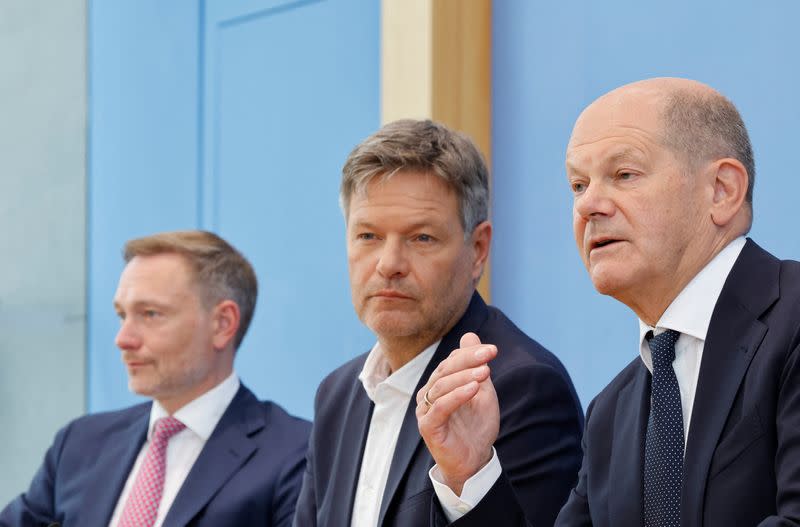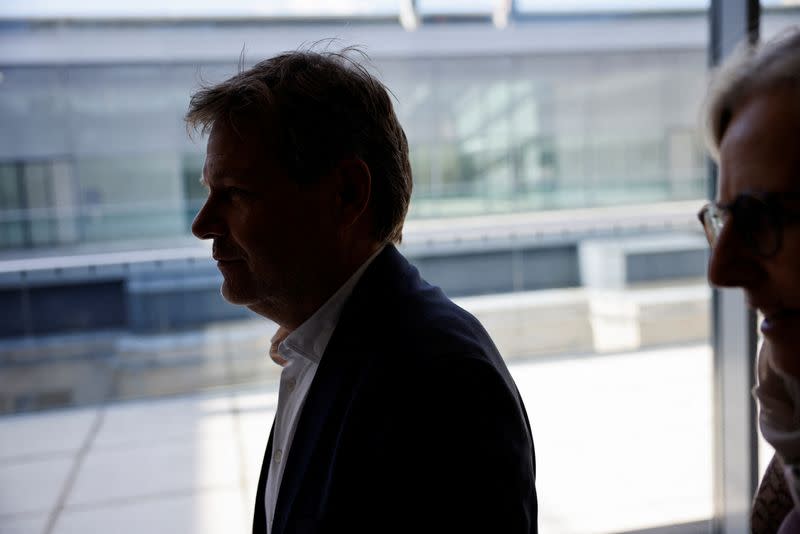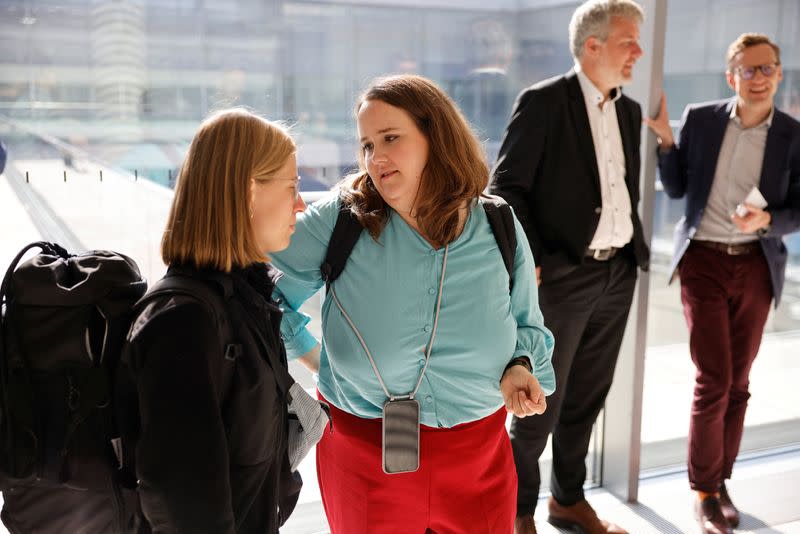Germany clinches budget deal to keep debt brake but boost growth
By Maria Martinez and Christian Kraemer
BERLIN (Reuters) -Germany's coalition government clinched a 2025 budget deal on Friday that will stick to the country's tight borrowing rules while offering a package to rev up stuttering economic growth and finance a massive military overhaul to meet NATO targets.
The deal was reached after months of negotiations in Chancellor Olaf Scholz's fractious three-way coalition, whose popularity has sagged during a cost of living crisis.
It offers some respite for Scholz, who pitched the agreement as a way to tide Germans through "turbulent and difficult times" and an explicit riposte to far-right forces surging in Germany, neighbouring France and other European countries.
Germany needs economic growth and solid finances in the midst of "economic and social changes all over the world that are challenging us," Scholz told a briefing.
"This uncertainty is often reflected in a strong right-wing populist and right-wing extremist force in many European countries and yes, even here in Germany."
Scholz's Social Democrats (SPD), Economy Minister Robert Habeck's Greens and Finance Minister Christian Lindner's Free Democrats (FDP) have been battling to resolve differences over future cuts and spending plans.
Lindner had stressed the importance of returning to the nation's constitutionally enshrined cap on spending, known as the debt brake.
The resulting deal stuck to Germany's debt rules but promised to keep German defence spending above the NATO target of 2% of GDP to fund a military overhaul and weapons support for Kyiv after the Russian invasion of Ukraine in 2022.
Business groups gave the deal a qualified welcome.
"This budget provides moderate impetus for economic growth and investment," said Tanja Goenner from the BDI business association.
"It contains some of the relief measures that industry has long been demanding. The bottom line is that this is still not enough to sustainably strengthen the forces of growth."
ECONOMY BOOST
The budget sees net borrowing of 44 billion euros, a record 57 billion euros in investment, and a total budget size of 481 billion euros.
It was accompanied by a package of measures that the government reckons will add more than half a percentage point to growth, or an additional 26 billion euros ($28.14 billion) in economic output.
It includes measures to incentivise people to work beyond their retirement age - an attempt to tackle Germany's shortages of skilled labour - and to help migrants enter the job market.
Berenberg's chief economist Holger Schmieding told Reuters such measures made sense but thought the benefits would be more modest than the government announced.
"With luck, it may add 0.1% to 0.2% to growth next year," he said.
Commerzbank's senior economist Ralph Solveen said it was too early to assess the impact before the draft budget was finalised on July 17.
The budget promised more support for children and families.
The Greens-run foreign ministry on the other hand had to swallow spending cuts that will slash humanitarian aid to 1.04 billion euros next year from 2.2 billion, but with a provision for extra money to tackle humanitarian crises when needed.
A source close to Foreign Minister Annalena Baerbock said the ministry accepted the cuts to avoid the worse alternative of triggering a coalition collapse and new elections.
The government also extended for two years a plan to cushion Germans from the effect of higher energy prices, and introduced new measures to slash red tape and advantageous tax conditions for companies in the depreciation of their assets.
Lindner said the government had made every attempt to find savings, but it was "by no means" an austerity budget.
The government will also present a supplementary budget for the current year with up to 11 billion euros in additional borrowing.
COALITION STICKS TOGETHER
Infighting over spending had cast doubt over the fitness of the coalition, which has rowed repeatedly since taking office in late 2021 in a term marked by economic slowdown, higher inflation and war in Ukraine.
Far-right forces have tapped into discontent with mainstream parties across Europe, including Germany, where the Alternative for Germany (AfD) came second in European elections in June.
"I am looking with concern at the second round of the parliamentary elections in France, after such forces have already come to power in the Netherlands, Belgium and two Scandinavian countries," Scholz said.
The budget was agreed as more warning signs emerged for the German economy, with industrial production unexpectedly falling and denting hopes of a recovery in the country's powerhouse manufacturing sector.
A compromise in which all the parties make concessions means that pain is spread equally, but keeping the debt brake could stoke disillusionment among many SPD and Green activists, Eurasia Group's director for Europe Jan Techau said.
"This disillusionment would almost certainly become visible during the fine-tuning process in parliament in the fall, a time when three important state elections in eastern Germany are looming," Techau said.
($1 = 0.9240 euros)
(Reporting by Andreas Rinke, Maria Martinez, Christian Kraemer, Rachel More, Miranda Murray, Alexander Ratz; Writing by Rachel More and Matthias Williams; Editing by Sabine Wollrab and Thomas Seythal, Muralikumar Anantharaman, Kim Coghill and Christina Fincher)

 Yahoo Finance
Yahoo Finance 


